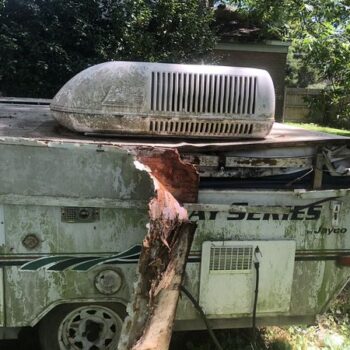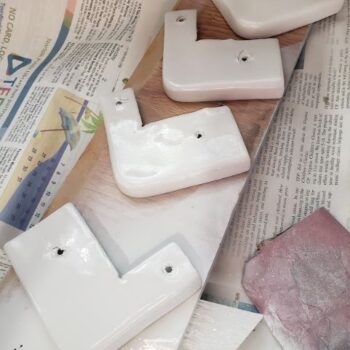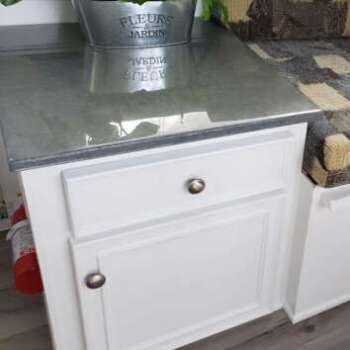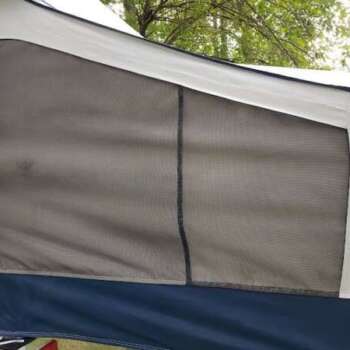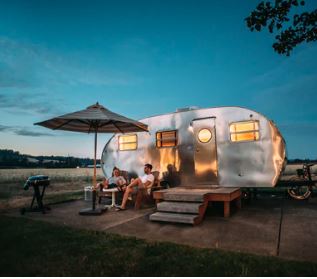
Here is a listing of some of our favorite camping hacks that we routinely use.
15 Minute Fire Starter
Make your own fire starter that will last for 15 minutes with ingredients you probably already have on hand and without having to make or prep anything in advance. All you need is a cotton makeup pad and vegetable oil, and you’ll be able to get kindling started in no time. We prefer not to use gasoline or lighter fluid and the commercial firestarter sticks take up valuable space at an extra expense. We’ve also tried the cotton ball with wax trick as well as the cotton ball with petroleum jelly, which have to be made in advance of a camping trip. Both the wax coated and petroleum coated cotton balls burned hot and fast, lasting just under 5 minutes.
Instead, we a use disc-shaped cotton makeup pad with canola oil, which we also use for cooking at the camp site. After getting our kindling ready, we pour a small amount of vegetable oil (maybe 3 teaspoons) in the middle of a disc, leaving 20% of the cotton pad uncoated. When lit, the cotton pad begins to burn low and slowly like paper. Once the oil begins to heat up, the flames increase and the cotton pad burns more like a wick than like paper for a solid 15 minutes. That’s plenty of time to get a good fire started with the kindling so that the logs can ignite. So simple and no need to make anything up in advance.
Convenient Charcoal Bags
Store charcoal in paper lunch bags or cardboard egg cartons for easy burning. We double up the paper bags (because they tear easily),fill it half full with charcoal briquettes, then roll up the top. It’s nice having the charcoal pre-portioned and ready to use. We place one bag of charcoal and one 15 Minute Fire Starter under kindling to start camp fires, before adding firewood.
Paper Bag Fire Starter
Keep a lunch bag around to toss in empty toilet paper rolls and any other paper products while you are camping. You can use this lateras a firewood fire starter. Keep the bag open, toss in a bit more kindling, and then add a 15 Minutes Fire Starter for a quick and easy way to make your camp fire.
Double Duty Herbs
If you grow your own herbs, you’ll definitely want to bring some along for camping. Keep a tied bunch of basil and lemon thyme near your tent or camper door to repel mosquitoes. When you’re cooking, throw a few sprigs in your food for a nice herb flavor. A bundle of spearmint or peppermint will keep the inside of your tent or camper smelling fresh and you can rub sprigs of it on yourself to keep bugs at bay. Bring along a bundle of rosemary, lemon thyme, basil and oregano. Pre-soak the herbs, then lay them around the perimeter of your fire logs right before cooking. Not only will smoked herbs impart flavor into your food, you’ll be the envy of the campground once the flavors waft into neighboring camp sites.
Mini Condiment Ingredient Bottles
Instead of lugging around full-sized bottles, or buying smaller sizes of ingredients you already have at home just for a camping trip, save, sterilize, and re-use small squeeze bottles or empty water bottles for storing cooking ingredients such as oil, mayo, sour cream.
Sealable Plastic Bag Toppers
Save the tops of large bottles for convenient plastic bag access. No spills or twisty ties needed. The large openings are great for conveniently getting at grapes, flour, sugar.
Pourable Bag Toppers
Store pancake mix, raw scrambled eggs, and other semi-liquid items for your camping trip in a bag with a water bottle cap connection at the top. Cut the cap connection off of the bottle just below the neck. Pull a plastic bag up through the threaded neck, secure in place with a rubber ban, and screw the top on. When you’re ready to use the food, just unscrew the top, pour out what you need and then put the top back on.
Minimalist Brewed Coffee
Melitta coffee dripper. So, this really isn’t a hack. It’s just that the dripper is an awesome substitute for a coffee machine that takes up too much space. This handy little gadget has been around for decades. It sits directly on your coffee mug. Just add a filter, coffee grinds and super hot water. The newer version also has openings that allow you to monitor the amount of coffee in your coffee cup.
DIY Aluminum Popcorn Popper
Use aluminum foil, ½ cup popcorn and 2 TBSP oil to create your own self-rising popcorn popper. Start with a 10 inch section of foil. Add the popcorn and oil in the center. Lay a 16 inch piece of foil on top and crimp it onto the bottom foil. Place it on a skillet and keep the skillet moving as the popcorn heats up and begins to pop.
Condiments To Go
Put together a Condiment Keeper to take with you on trips. You can save a large amount of space and money by using packets instead of buying and storing larger bottles. Include condiments that will be needed for meals, but also an assortment of not-so-common items such as syrup, mayo, salad dressing, croutons, and more.
DIY Condiment Packets
DIY condiment packets are a nice solution for camping food items that aren’t normally available as condiment packets. Having baked potatoes on your camping trip but don’t want to bring an entire tub of sour cream? Just make a condiment pouch to hold enough sour cream for each person.
Condiment pouches are super easy to make, even if you don’t have a food bag sealer. Just use a curling iron or clothes iron, with either one set on the lowest setting. Cut sections of zip lock bags to the desired size, with an extra 2 inches at the top (you can trim it down later if needed). Seal 3 sides by placing a piece of paper between the plastic and the iron before applying light, quick pressure. It only takes a few seconds to seal, but you should test out what setting and time works best. Use a small funnel to add your food item and fill the pouch 2/3 full. Then press out any excess air and seal the top.
Since you won’t be sterilizing the pouches, it’s a good idea to only make what you’ll need for the trip rather than for long term storage.
Water Bottle Ice Packs
Freeze your water bottles and use them in the cooler instead of ice. You’ll save space by not needing ice packs, plus you’ll have bottled water as needed. We don’t unpack food into our camper’s refrigerator until we are a the camp site, so this is a great way to keep food fresh until we arrive.
Skillet Scrubber
Cooking over a camp fire is fun, but the cleanup isn’t. One trick to making it less of a chore is to put your empty skillet back over the fire as soon as food has been served. Fill it with water and a few drops of detergent, let it come to a boil, then remove it from heat and set aside until you’re ready to clean. If your camp site has rocks or gravel, add a handful to the skillet and swoosh the skillet around a few times. The rocks will help loosen up stuck-on food particles.
A Ray Of (Solar) Light
Many campgrounds can get pretty dark at night. Instead of relying on battery powered lanterns or electric lights hooked up to your camper, just use solar landscape lights (that you probably already have at home). We use a solar landscape spotlight that is normally used to light our walkway at home. When fully charged, it lasts up to 10 hours, and we have the option of setting it to dim or full lighting.
Speaking Of Solar…
Although we try to “unplug” when camping, having a fully charged cellphone is a necessity. If there’s no electric hookup, the only option for charging the phones is to use the car’s charger. But why not get a solar power bank? Not only can you use it if your phone’s battery is dead, you can also use it to slow charge your battery.
Dirty Laundry
Over the course of 5 or more days, dirty laundry can get pretty “odiferous”. Because we are in close quarters and to keep odors at a minimum, everyone gets a kitchen trash bag that has two scented dryer sheets inside to use as a hamper for their dirty laundry. Any stains also get a squirt of dish detergent before going in the trash bag. The dryer sheets makethe drive home much more bareable, and reduces odors from setting into the fabric before they are washed. There’s nothing worse than washing laundry and finding that it still has hints of musty smells even after being cleaned.

